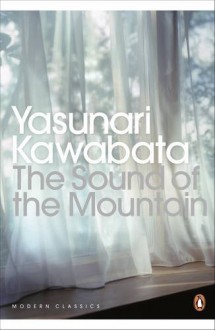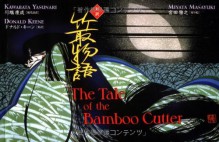
Shingo Osada is growing old, coming up to his retirement and experiencing more than one instance of temporary memory loss. He is becoming wistful and reflective in his old age, beginning to have odd dreams that wake him and hearing odd sounds that he takes to be omens of his own impending death. This provides a backdrop to two crises in the family - the failure of daughter Fusako's marriage and her return to the family home with her two daughters, and son Shuichi's affair which threatens to destroy his marriage to the beautiful Kikuko.
For me Yasunari Kawabata's
The Sound of the Mountain is not only a masterpiece of Japanese literature, but a masterpiece of 20th Century world literature. His elegant and precise prose, more akin to poetry and much like haiku at times, is a pleasure to read, and Seidensticker's translation by all accounts does it justice. This is not a novel where a lot happens, where we read a lot of action or see much in the way of exciting plot twists, but it is a thoughtful and poignant meditation on what it means to grow old, and what it means to still have regrets. Shingo regrets not being able to marry wife Yasuko's sister due to her suicide, while also regretting not being a better husband to Yasuko herself. At the same time, he regrets not being a better father to daughter Fusako, whose marriage is breaking down; and son Shuichi who is having an affair. His regret on not being a better father manifests itself in his treatment of daughter-in-law Kikuko, who he treats as if she were his own daughter, sub-consciously over-compensating for his perceived neglect towards his own children - something that both Fusako and wife Yasuko both remark upon with varying degrees of distaste.
On another level the book also acts as a representation of a Japan that was rapidly changing beyond all recognition and emerging from years of American occupation after the Second World War. Some of Shingo's frustrations come from the contrast in attitudes between his own generation and that of his children. Shuichi's own attitude towards his wife, and his womanising are in some ways blamed on his experiences of fighting in the war, as much as they are because of Shingo's own perceived failures as a father. But are his failures as large as he himself imagines? Shingo is a seriously flawed but ultimately normal man who possesses the same flaws and traits of the vast majority of people. A man whose position as patriarch is threatened not only by his age, but by the changing of attitudes in his own country. And ultimately a man who feels his own position in life itself slipping away from him - however slowly this may be. Kawabata paints his picture of what it means to grow old with an understatement and beauty that quietly demands to be read. This is as much why his work is still widely read today - it has a timeless relevance that still remains, even fifty years after his death.


 Log in with Facebook
Log in with Facebook 











